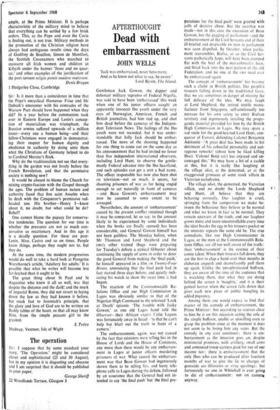Sir: Is it more than a coincidence in time that
the Pope's encyclical Humanae Vitae and Mr Dubcek's encounter with his comrades of the Warsaw Pact should have happened when they did? In a year before the communists took over in Eastern Europe and Lenin's concep- tion of materialism was triumphant, the Russian armies suffered upwards of a million losses—every one a human being—and their fellow-Christians were engaged in demonstrat- ing their respect for human dignity and obedience to authority by doing unto them what the Christians of Germany helped to do to Cardinal Mercier's flock.
Why do the traditionalists not see that every- thing in the garden was not lovely before the French Revolution, and that the permissive society is nothing new?
It would be absurd to blame the Church for mixing crypto-fascism with the Gospel through the ages. The problem of human nature and authority faced that fine saint Anselm when he dealt with the Conqueror's permissive red- headed son. His brother—Henry I—knew about it, no doubt, but what could he do? Rebel?
One cannot blame the papacy for conserva- tive tendencies. The question for our time is whether the pressures are not so much con- servative as reactionary. And in this age it is a deadly question. For these are post- Lenin, Mao, Castro and so on times. People know things, perhaps they ought not to, but they do.
At the same time, the modern progressives would do well to take a hard look at Peregrine Worsthorne's article, 'Adultery for adults.' It is possible that what he writes will become less far-fetched than it ought to be.
The great thing about St Paul and St Augustine who knew it all so well, wa: that despite the distance and the dark; and the murk of imperial Rome, they did not revert to laying down the law as they had known it before, but stuck fast to Jeremiah's principle, that the glory and love of God are to be written on fleshly tables of the heart, so that all may know Him, from the simple peasant girl to the greatest.






































 Previous page
Previous page